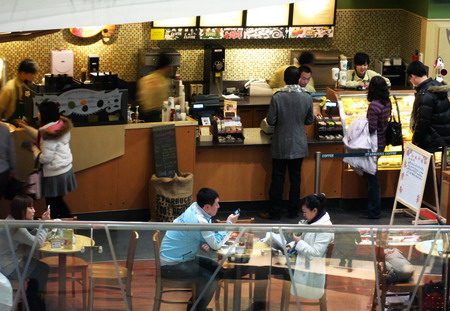Economy
HSBC PMI hits 27-month low point
By Simon Rabinovitch (China Daily)
Updated: 2011-04-07 11:21
 |
Large Medium Small |
|
 |
|
A cafe in a department store in Beijing. The HSBC Purchasing Managers Index for the Chinese services sector aims to provide a timely snapshot of conditions in industries from restaurants to computing. [Photo / China Daily] |
BEIJING - The HSBC Purchasing Managers Index (PMI) for the Chinese services sector edged down to a 27-month low in March as rising costs, especially salaries, limited the expansion of business activity.
The PMI, which aims to provide a timely snapshot of conditions in industries from restaurants to computing, fell to 51.7 from 51.9 in February.
A survey reading above 50 indicates expansion; a figure below 50 denotes contraction. The figures are seasonally adjusted.
The March decline reflects the central bank's sustained use of monetary tightening to control inflation. In its latest move, the People's Bank of China raised interest rates on Tuesday for the fourth time since October.
| ||||
Analysts said the official PMI does not adequately reflect seasonal factors, particularly the Lunar New Year holiday, which fell in February this year, making the HSBC version a better gauge of underlying trends.
According to the HSBC survey, input prices rose markedly in March to a four-month high, with respondents pointing to higher fuel and wage costs. The latter acted as a drag on employment, which saw jobs created at a slower pace than in February.
"The service sector slowed for a third consecutive month, reflecting the filtering-through of policy-tightening effects," said Qu Hongbin, HSBC's chief economist for China.
"That said, there's no need to panic about a sharp slowdown in services thanks to the continuous improvement in the labor market and rapid income growth."
The services sector accounted for 43.4 percent of China's output in 2009 - much less than in more developed economies.
Reuters
| 分享按鈕 |



